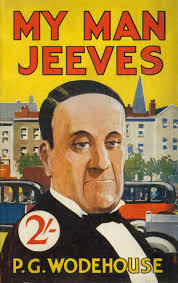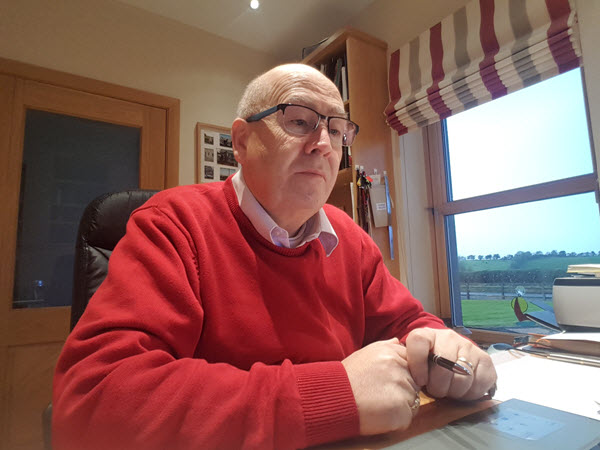As we all know, various words come into vogue, adopted from other settings and other uses, and drift into ordinary discourse. And it can happen so quickly, because this world in which we live of instant communications means that even a thought in Australia reaches these shores some seconds later.
Call me old-fashioned but I don’t like a lot of these new words being used, out of their original setting and context, and just being dropped into our everyday language because – well, I’m not sure of why.

When I was growing up, my late father used to encourage me to read the books of P. G. Wodehouse. He said to me time and again: “You won’t find better English written anywhere else.” And I did read the books of P. G. Wodehouse. Perhaps I did so at the beginning on the encouragement of my Dad but certainly I came to love the stories about Jeeves and his exploits and misadventures. Along the way, the English language that I read rubbed off on me in an unconscious way and it undoubtedly formed how I use English today. And even more does it affect how I react when I read poorly written English. To this day, as I read – especially newspapers – my mind instantly edits bad English so that the wrong words don’t enter into my mind!
However, back to my point about these new words. I have long given up the battle on ‘going forward.’ Another phrase that I dislike because it is so out of its original setting and context is the phrase to ‘double-down.’ Two years ago, it seems never have been used but now, hardly a day goes by without a newspaper article (or two), or an interview on television or radio, or in some other similar circumstance, without the phrase being added into the sentence. Is fluency in English for some so poor that this is all they have? My Dad’s advice could be repeated here, viz. go and read P. G. Wodehouse. I don’t think you’ll find anywhere in his books references to going forward and doubling down.
Maybe all those years ago, Lewis Carroll, author of, “Through the Looking Glass” was correct when he wrote:
“I don’t know what you mean by ‘glory’,” Alice said. Humpty Dumpty smiled contemptuously. “Of course you don’t – till I tell you. I meant ‘there’s a nice knock-down argument for you!'” “But ‘glory’ doesn’t mean ‘a nice knock-down argument’,” Alice objected. “When I use a word,” Humpty Dumpty said, in rather a scornful tone, “it means just what I choose it to mean – neither more nor less.”
“The question is,” said Alice, “whether you can make words mean so many different things.” “The question is,” said Humpty Dumpty, “which is to be master-that’s all.”
What got me thinking of this was the words that seems to define how we live our lives right now and these words are, ‘isolation’ and ‘lockdown.’ To be sure, their use is not new. In the case of ‘lockdown,’ I’ve never really liked the choice of this word outside of the context in which it originates. Prisons have long had the concept of lockdown, when a situation arises that requires people to be in their cells, and all movement suspended and prohibited. So for me, it is always associated with a loss of liberty, and of something that is linked to punishment.
Since midnight last night, we are now in lockdown, we are asked to remain in our homes, not to go out except for the most essential journeys such as necessary grocery shopping or any one of a number of other, very limited, reasons. A walk or run, that doesn’t take us further than two kilometres of our home is allowed, but that is it. All of a sudden, our world is confined to incredibly finite limits.
Isolation. We must not visit friends or relatives and indeed, we must not allow friends or relatives across our threshold (not that others would venture beyond the boundaries of their own isolation to even do this). If we meet anyone during our two kilometres of fresh air, we must remain at a distance, not get close. No longer can we hug someone, or shake their hand, give them an encouraging clap on the back. If a package is delivered to the door for any reason, the person delivering must place it on the ground outside and step back before we open the door. We are not to be asked to sign for anything.
And for those of us for whom our faith and the practice of our faith is important, we can no longer go to Mass. (I know, we can join via the internet and it is marvellous that such opportunities exist but it can never replace that of being in a church when a Mass is celebrated.) I don’t think that in my entire life since my First Communion at the age of seven, that I have ever gone so long without being in a church for Mass.
But this is the isolated, cut-off lives, that we now must lead. Whether for two more weeks or two more months – and who knows how long it will be – this is what it is to live. And not just here, in my little wonderful, rural, peaceful location in the Westmeath countryside, but across the globe.
I was fortunate to travel to many different places on this planet during my ten years with one employer, journeys that took me to all continents except Antarctica. I have been to so many countries, so many cities. But what I see on our television screens at this time does not remind me of the places to which I have been. I visited India (or perhaps, more accurately, Mumbai) very many times and grew to love the place and its people. I remember streets teeming with people night and day. I remember being in taxis going to the airport at times when there was so much traffic, the driver thought nothing of driving on the footpath – when there was sufficient room – and getting ahead of the line upon line of solid traffic. But today where are these teeming streets, in fact, where are the people? Isolated, cut-off.
I have very many French and Italian friends and their natural greeting is so warm and so personal. When we meet for the first time in the day, we don’t just say, “bonjour” or, “buongiorno” but always supplement it by a handshake – even if we see these same people every day of the week. And more often than not, except in the case of complete strangers, there is what the French call, the “faire la bise” or cheek kiss (and typically, both cheeks). So in that moment, we are brought into a closeness, we are not just like ships passing in the night, strangers passing by on the street. We celebrate our togetherness. And while cultures will differ, it is hard to imagine a world where a day is not marked by these multiple acts that remind us of our togetherness.
And now we have isolation! Even if we see our friend, our neighbour, we have to ensure a mandated physical distance, and the idea of even a handshake, if that was all it was to be, is completely impossible. And very quickly, we miss this. And maybe like me you never stopped to think of how much this means and how important this simple contact is to how we live our lives. However, like so many things, now that it is gone, we mourn its absence. We crave the day when we can once again take hold of someone’s hand and greet them, give someone a hug to say: “You are important, and I care about you.”
And maybe, when all of this is over, and I am once again in France and together with my very many dear friends there, the “faire la bise” will carry ever so much more meaning. It is true that we value something all the more when it is taken from us.
As you can see, a lot of thoughts have been going about in my head over this past week about the ideas of isolation and of lockdown. Because these are not positive words. Who would wish for isolation? Who would wish for lockdown?
And what I have realised over the past week in particular, is that despite the lockdown conditions and the associated isolation, never have I felt more connected to people. And not just people in my own local area. I think of my friends in Massachusetts, New York, New Jersey and California. I think of those who were our neighbours when we lived in Marshfield Hills, on Boston’s South Shore. I think of my very dear friends in Sri Lanka, those in France, Italy, Spain, and of course, nearer to home, those in Scotland, Wales, and England. I could continue to list countries.
Last evening, I spoke with a friend from the Franciscan Friary nearby, a man in his eighties. Earlier I had asked someone for his number, he was told this and later picked up the phone to me. And what a welcome phone call it was. Since this Friar came to live in the local Friary about three or four years ago (maybe more, I lose track of time), he has become a good friend and I treasure his friendship. But it is what sparked my request for his number that in part, reminded me of the significance of connection in the midst of isolation. This man has a problem with his eyesight (macular degeneration) and it occurred to me that whereas others in his community might have access to email and texts, his contacts might be more limited. And so I decided that a call would be a good idea. And while in the end, it was he who called me, I knew at the end that it had been the right decision – for both of us! But the message isn’t in what transpired during the call, per se, but the fact that, except for this time of isolation, I would probably not have been as aware of reaching out and connecting!

So as I sit here in my office at home, looking out at the fields opposite and the sheep grazing there, I have realised this new isolation has brought me closer to others. I think about them more often, and yes, I pray for them in whatever is their current situation, I remember how important they are in my life and so, I look forward, more than I probably have ever done, to the possibility of meeting them again. Of course, it shouldn’t have taken this crisis to tell me all of this but I am grateful to the insight that this time has brought.
So maybe Humpty-Dumpty was right after all because for me, I’ve learned that isolation does not mean alone and lockdown is not punishment but a time to connect. All in all, you can imagine my surprise to find myself describing this time as a gift!